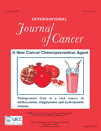Frequent p16INK4a promoter hypermethylation in human papillomavirus-infected female lung cancer in Taiwan
Abstract
Inactivation of p16INK4a gene through promoter hypermethylation has been frequently observed in non small cell lung cancer; however, various studies have shown a controversial correlation between p16INK4a hypermethylation and cigarette smoking. Our recent report showed that human papillomarvirus (HPV) 16/18 infections were associated with the development of nonsmoking female lung cancer in Taiwan and we further speculated that HPV infection may be linked with p16INK4a hypermethylation. To verify the influence of environmental exposure, including cigarette smoking, environmental carcinogen exposure and HPV infections on p16INK4a hypermethylation, tumors from 162 lung patients, including 67 smoking males, 41 nonsmoking males and 58 nonsmoking females, were subjected to p16INK4a hypermethylation analysis by methylation-specific PCR. As the results showed, p16INK4a hypermethylation was detected in 40 (59.7%) of 67 smoking male, 15 (36.6%) of 41 nonsmoking male and 35 (60.3%) of 58 nonsmoking female lung tumors. This result seemed to reveal that gender and cigarette smoking both possess an equal influence on p16INK4a hypermethylation. This result also led to a speculation that HPV infection may promote p16INK4a hypermethylation in nonsmoking female lung cancer patients. From our data, p16INK4a hypermethylation frequency in nonsmoking female lung tumors with HPV infection was as high as 70% (30 of 43) compared to those without HPV infection (33%; 5 of 15). In fact, the correlation between HPV infection and p16INK4a hypermethylation was only observed in nonsmoking female lung tumors (p = 0.017), but not in smoking male or nonsmoking male lung tumors. Moreover, the reverse correlation between p16INK4a immunostaining and p16INK4a promoter hypermethylation was also only observed in nonsmoking female lung tumors. These results strongly suggested that the involvement of HPV infection in lung tumorigenesis of nonsmoking female cancer patients in Taiwan may be mediated at least in part through the increase of hypermethylation to cause p16INK4a inactivation.




